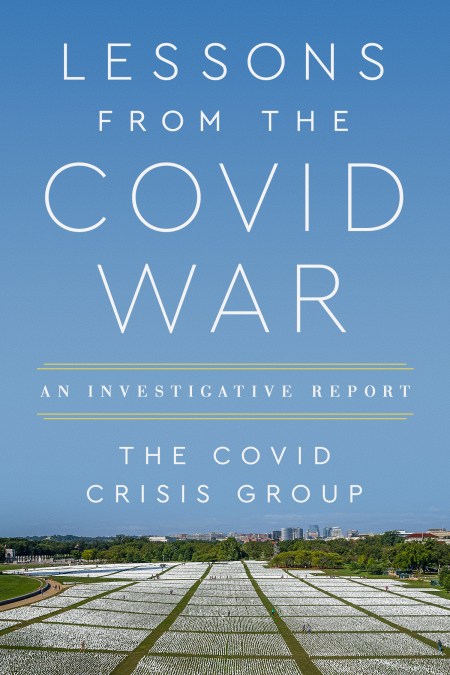What we did right. What we did wrong.
Bryan McKenzie, bkm4s@virginia.edu
Since January 2020, the War on COVID-19 has claimed the lives of more than a million Americans, exposed serious weaknesses in the country’s health system and showcased amazing strength and cooperation.
“This was a global war against an alien threat, a virus that we did not have any immunity to,” said Dr. Carter Mecher, medical advisor to the Public Health Company and one of 34 experts who make up the Covid Crisis Group. Directed by a UVA professor, it is a nonpartisan group of experts that reviewed the U.S. response to the pandemic.
“When you ask how well we did, just look back at how many lives were lost. We are now at more than 1.1 million deaths,” he said. “Then there’s the estimate of the number of Americans who may have long COVID, which may be 5% to 7%, something in the order of 15 to 20 million. That’s what this pandemic has left in its wake.”The Covid Crisis Group formed in 2021 to review how the medical industry, federal, state and local agencies and the population, responded to the pandemic. Led by former 9/11 Commission Executive Director Philip Zelikow, UVA’s White Burkett Miller Professor of History, its goal was to find out what happened, why and how the country could do better.
The group planned to hand its research over to an official presidential or congressional commission on the COVID crisis, but pandemic-related political disagreements prevented the convening of any such group. Instead, the Covid Crisis Group decided to independently publish its findings.
The group released its report, “Lessons from the Covid War,” in book form on April 25 through Public Affairs Books, a part of Hachette Book Group.
Mecher said the book uses the metaphor of war to describe the fight against the virus. The first challenge in war, he said, is to warn the population and prevent attack, including how the virus is transmitted and who it impacts the hardest.
The second challenge is to contain the attack. The third is to defend the community. The fourth challenge is fighting back with medical countermeasures, including vaccines and antivirals drugs.
“I think one of the one of the places where we shined was in the development of vaccine, in Operation Warp Speed. We first learned about this outbreak in January 2020 and within 11 months, we had vaccines.” Mecher said. “That is pretty amazing. That required bringing together the government, public sector and the private sector in a focused effort to develop effective vaccines as quickly as possible.”
The report also provides an opportunity to rethink how the American health care system works, as well as public health care policy.
“When you go to war, you go to war with the army you have not the army you wish you had,” Mecher said. “We found that the operational capability for fighting this war really wasn’t at the federal or national level. It was at the state and local level, across the 2,800 or so state and local health departments.
“But those health departments were built for the challenges of the late 19th century. In a sense, we went to war with the equivalent of 50 state militias. Each one of those health departments is unique and historically understaffed and underfunded,” he said.
Other flaws also worked to the virus’ advantage. The nation’s public health system is separate from its health care system. Worse, the health care system is not a system at all.
“It’s a collection of hospitals and individual health care systems that don’t often work or collaborate in peacetime,” he said. “In addition, both public health and health care are disconnected from biopharma, which is the source of the medical countermeasures, the weapons we need in this war. We had lots of disconnects between our public health system our healthcare system, and biopharma.”
Critical delays in creating reliable tests and a testing regimen meant health officials were “flying blind” in the first few months of the pandemic. Conflicting guidance from the U.S. Centers for Disease Control and Prevention created difficulties and doubt.
“There was confusion in messaging regarding the use of masks. Masks weren’t helpful then they were helpful, stop using masks and then resume using masks,” Mecher said. “We need to do much better to communicate what we know and what we don’t know. It that takes time to understand and learn about the virus and as we do, things are constantly changing. Trying to communicate that change is extremely difficult.”
Mecher, who served as a senior medical advisor for the Office of Public Health at the Veterans Administration and former director of medical preparedness policy for the Homeland Security Council, said he didn’t expect the nation’s collective reaction to COVID-19 casualties.
“One of the things that surprised me is our reaction to mass death. When you get into over a million dead, it becomes mind numbing. It becomes just a number or a statistic,” he said. “We almost shrug our shoulders over it. We’ve talked about herd immunity with the virus and it’s almost like we have a herd immunity to the level of loss that we’ve experienced.”
Mecher said the group hopes its report will help America prepare for future pandemics.
“The lessons we’ve drawn are the result of looking backwards, but it cannot end here,” he said. “What matters is how we change the way future pandemics will be lived, how we experience them, how we assess the threat and how we respond in a timely manner to prevent needless suffering.”
